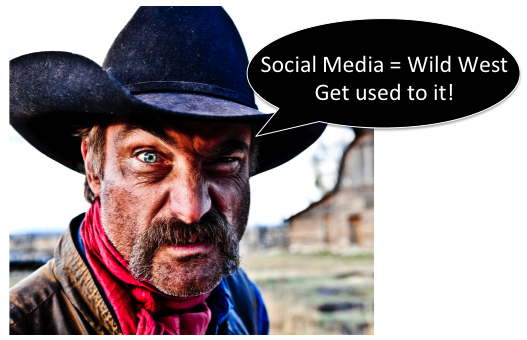
Within the last year, I’ve attended dozens of meetings with communicators in which a single, consistent order is dispatched: “We’ve got to incorporate social media in ALL our strategies.”
To the casual observer, it sounds like a slam dunk. Right? After all, we know how to create a Facebook page or Twitter handle, and we’ve honed the craft of writing in 140 characters or less.
Then there are those thoughtful thinkers who pause for a moment to go deeper in understanding what it means to be strategic with social media.
And to others, anything social media falls in what they believe is the age of experimentation: the “Wild West” of the Internet. While I’m a big proponent of innovating with social media strategies, the days of the Wild West are – in a word — over.
What all these communicators have in common is the need for consistent definitions of social media competencies. Let’s face it; we’ve had enough experience with this stuff to put some discipline behind the skills that work in this space. Social media teams – agency and corporate alike – are seeing their ability to add headcounts slow. They’ve hired professionals who had deep capabilities in one or a few areas, but need to let more out of them now.
The new reality for communicators at all levels is that we have to develop deeper, broader and more integrated social media skill sets — for ourselves, our teams and our businesses.
That’s where my journey began in January of this year – when Shel Holtz and Richard Binhammer joined me in identifying social media competencies, and articulating what it looks like to progress through them (basic, mid-level, advanced).
It was a fascinating journey that yielded – count ‘em – 34 different competencies that fell into four broad categories:
- Content production; think blogging, podcasting and graphics-type skills here.
- Project management skills particular to social media; such as search engine optimization (SEO), blogger influencer outreach, media buying and more.
- Social-specific skills; like community management, social customer service and monitoring and a bunch more.
- Social media center of excellence leadership skills; including cross-functional team coordination, policy development and management, and governance, among others.
Based on what we’ve seen and learned, our assertion is that while some organizations have basic social media development efforts in place for broad-based employee groups, there is limited discipline around competencies. The need for high-functioning social media teams is increasingly important as use of social media by business grows and integration of social media into business processes becomes more common.
Why?
- 79% of companies use, or are imminently planning to use, social media. Nearly half of the companies who were rated as “effective” in social media said it was integral to the company strategy. – Harvard Business Review Analytics Services
- 52% of executives say that social business is important to their companies today. 86% say it will be vital in three years. 28% of CEOs say social business is vital to their organizations. – MIT Sloan Management Review 2012 Social Business Global
- During the next five years, CEOs expect social media to rise to the second-most important way businesses connect with customers. – IBM 2012 CEO study
- Many executives also cite overall organization shortcomings, which include acquiring the skills necessary to carry out a digital business agenda. They need to be resourceful in developing homegrown skills. – McKinsey 2012, Digital and Executive challenges
Let’s be honest. Developing skills in this rapidly developing era of social/digital business is a challenge, especially when we’re still trying to develop some of the more traditional skill sets. But like anything worth doing or developing, we’ve got to start with a road map to get us there. For sample competencies, feel free to read our white paper at www.sme-squared.com.


